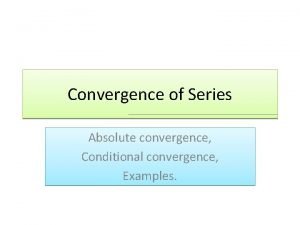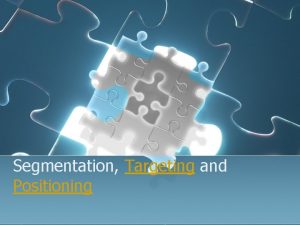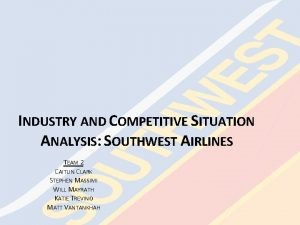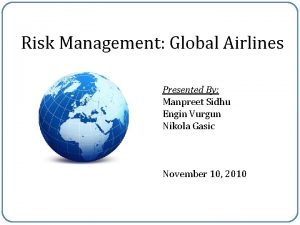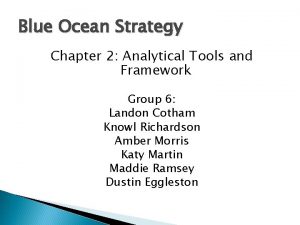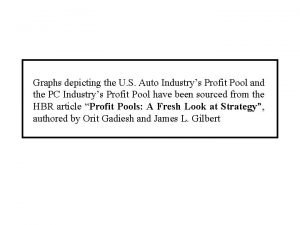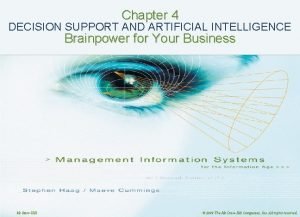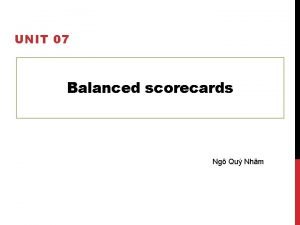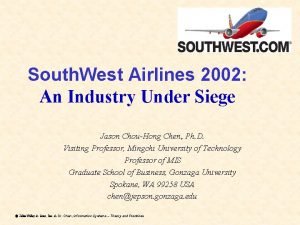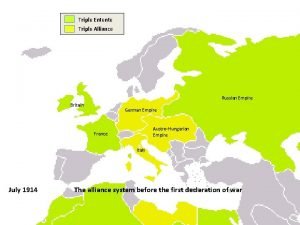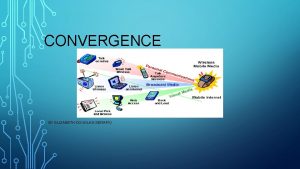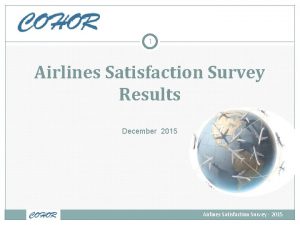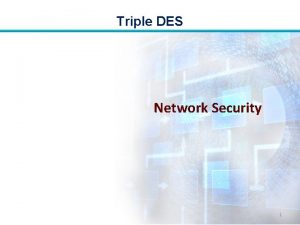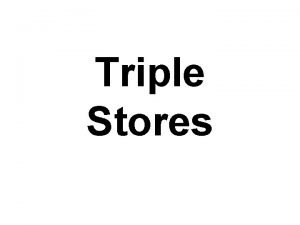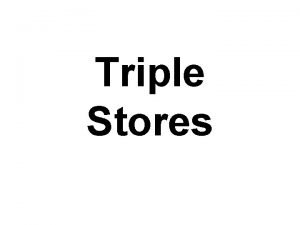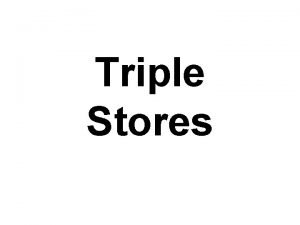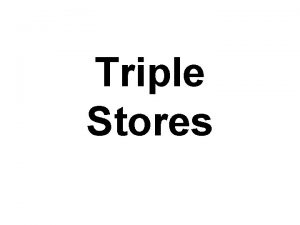The Triple Convergence Southwest Airlines Southwest airlines have




































































- Slides: 68


The Triple Convergence

Southwest Airlines Southwest airlines have no reserved seats, only zones A, B and C. The As board first, then the Bs and the Cs board last. Southwest allows you to download your ticket at home beginning at 12: 01 a. m. the night before a flight. In Globalization 1. 0 there was a ticket agent. In Globalization 2. 0 the e-ticket machine replaced the ticket agent. In Globalization 3. 0 you are your own ticket agent.

Konica Minolta Business Technologies Bizhub, a piece of office machinery that allows you to do: Black-and-white or color printing Copy a document Fax it, scan it to e-mail or Internet-fax it

Components of the Triple Convergence First, all ten of the flatteners started to converge and work together in ways that created a new, flatter, global playing field. As this new playing field became established, both business and individuals began to adopt new habits, skills, and processes to get the most out of it. Second, the merger of this new playing field for doing business with the new ways of doing business. Third, a whole new group of people, several billion, walked out onto the playing field from China, India and the former Soviet Empire.

Convergence I The flatteners have been around as early as the 1990 s but it had to spread and take root and connect with one another to work. In Southwest case There were enough PCs around, enough bandwidth, enough computer storage, there were enough Internetcomfortable customers, and enough software know-how for Southwest to create a work flow system that empowered its customers to download and print out their own boarding passes at home.

The flatteners needed time to converge and start to work together in a complementary, mutually enhancing fashion. That tipping point arrived sometime around the year 2000. The net result of this convergence was the creation of a global, Web-enabled playing field that allows for multiple forms of collaboration – the sharing of knowledge and work-in real time, without regard to geography, distance, or even language.

Convergence II Introducing new technology alone is never enough. Productivity comes when a new technology is combined with new ways of doing business. The whole way of doing business had to be reconfigured and there must be a critical mass (managers, innovators, business consultants, business schools, designers, IT specialists, CEOs, workers) who understand are comfortable with this new way of doing business.

The ten flatteners brought forth the convergence of a set of business practices and skills that would get the most out of the flat world. And then the two began to mutually reinforce each other. Changing traditional vertical-command-control oriented to less command control and more about connecting and collaborating horizontally. From vertical chain command for value creation to a much more horizontal chain of command for value creation.

Horizontal collaboration To collaborate and manage horizontally require a totally different set of skills from traditional topdown approaches. HP has gone from a company of 87 different supply chains (managed vertically and independently with its own hierarchy of managers and back-office support) to a company with just 5 supply chains that manage $50 B in business, and where functions like accounting, billing, and human resources are handled through a companywide system.

Not until the consumers change their ticket-buying habits and reengineered themselves to collaborate horizontally with Southwest, this technological breakthrough won’t produce a productivity breakthrough for the consumers or Southwest

WPP is a world leader in advertising WPP is based in England. A product of the consolidation of some of the biggest names in the business. It’s advertising agency company holdings include the Grey Group, Ogilvy & Mather Worldwide, Young & Rubicam Brands and JWT The alliance was put together to capture more and more of big clients’ marketing needs, such as advertising, direct mail, media buying and branding.

WPP collaboration Increasingly, we find ourselves pulling together individuals from within each of these companies to form a customized collaborative team just for one client. The solution that will create value for that client did not exist in any one company or even in the traditional integration of the companies. It had to be much more specifically tailored. We plucked the right individual who is the right ad person, to work with the right brand person and the right media person for this particular client.

Convergence III 3 billion people who had been frozen out of the field suddenly found themselves liberated to plug and play with everyone else. China, India, Russia, Eastern Europe, Latin America and Central Asia had never been allowed to compete and collaborate before, because they lived in closed economies with very vertical, hierarchical political and economic structures. Their economies and political systems all opened up during the course of the 1990 s.

New players, new playing field These 3 billion people converge with the new playing field and the new process. Now, they could compete and collaborate more equally, more horizontally, and with cheaper and more readily available tools than ever before. This triple convergence is the most important force shaping global economics and politics in the early 21 st century. With access to billions of pages of raw information, the next generation of innovations will come from all over Planet Flat.

Economist Richard Freeman In 1985, “the global economic world” comprised of North America, Western Europe, Japan, as well as chunks of Latin America, Africa and the countries of East Asia. The total population of this global economic world, taking part in international trade and commerce was about 2. 5 billion people. By 2000, as a result of the collapse of communism in the Soviet Empire, India’s turn from autarky, China’s shift to market capitalism, and population growth all over, the global economic world expanded to encompass 6 billion people. Another 1. 5 billion new workers entered the global economic labor force.

Winners The winners will be those who learn the habits, processes, and skills most quickly The new players can leap right into the new technologies without having to worry about all the sunken costs of old system. It means they can move very fast to adopt new, state -of-the-art technologies. For example, many Chinese just skipped over the landline phase to the cell phone phase.

Example: Dhruva Interactive Rajesh Rao, founder and CEO of Dhruva Interactive, a small Indian game company based in Bangalore. Dhruva is located in a converted house on a quiet street in a residential neighborhood of Bangalore. It has two floors of Indian game designers and artists, trained in computer graphics, working on PCs, drawing various games and animated characters for American and European clients.

Rajesh’s vision: Having lived and worked in Europe, as a student, I was clear in my choice that I would not leave India. I wanted to do my thing from India, do something that would be globally respected and something that would make a difference in India.

March 15, 1995 Rajesh started as a one-man operation company His father gave him the seed money for the bank loan to buy a computer and a 14. 4 kbp modem to do multimedia applications aimed at the education and industry sectors. By 1997, they were a 5 -man team. Though they did some path-breaking work in their chosen field they realized that this was not challenging them enough. End of Dhruva 1. 0

March 1997 They partnered with Intel and began the process of reinventing themselves into a gaming company. By mid 1998, they were showing global players they were capable to design games and develop the outsourced portions of games designed by others. On Nov 26, 1998, they signed their first major game development project with Infogrames Entertainment, a French gaming company. They decided to position themselves differently. End of Dhruva 2. 0

March 2001 Era-positioning Dhruva as a provider of game development services. The computer game business every year grosses more revenue than Hollywood, and has some tradition of outsourcing game characters to countries like Canada and Australia. They sent out their new game demo, Saloon, to the world. The theme was the American Wild West… None of them had ever seen a real saloon before, but they researched the look and feel usin the Internet and Google.

The theme was deliberate, they wanted potential clients in the USA and Europe to be convinced that Indians can ‘get it’. The demo was a hit and it landed them a bunch of outsourced business, and they have been a successful company ever since.

Rajesh: several things had to come together First, enough installed bandwidth so he could e-mail game content and instructions back and forth between his own company and his American clients. Second, the spread of PCs for use in both business and at home, with people getting very comfortable using them in a variety of tasks. Third, the convergence of the work flow software and Internet applications that made it possible for a Dhruva to go into business as a minimultinational from day one: Word, Outlook, Net. Meeting, 3 D Studio MAX. But Google is the key.

In the old days, these software programs would have been priced beyond the means of a little Indian game start-up, if not for the open-source free software/shareware programs that were comparable and compelling. They have artists and designers working from home made possible by the Internet, using a secure feature called VPN [virtual private network], making their presence no different from the guy in the next cubicle.

Rajesh: You can source the best product or service or capacity or competency from anywhere in the world today, because of this whole infrastructure that is being put into place. The only thing that inhibits you from doing that is your readiness to make use of this infrastructure – which made the world a small place. India can’t relax, they can’t do the same things – they need to keep running ahead of China and Eastern Europe.

Rajesh message Everybody needs to wake up to the fact that there is a fundamental shift that is happening in the way people are doing business. Everyone needs to improve themselves to be able to compete. It is just going to be one global market. Their give-away caps were made in Sri Lanka – good quality at the right price!

Bill Gates 3 o years ago, if you had a choice between being born a genius on the outskirts of Bombay or Shanghai or being born an average person in New York, you would choose NY, because your chances of thriving and living a decent life there, even with average talent, were much greater. But!!! As the world has gone flat and so many people can now plug and play from anywhere, natural talent has started to trump geography. Now, Gates said, he’d rather be a genius born in China than an average guy born in New York.

The last 20 years Were just about forging, sharpening, and distributing all the new tools with which to collaborate and connect. The real IT revolution is about to begin, as all the complementarities between these tools start to really work together to level the playing field. This is the era in which technology literally is transforming every aspect of business, every aspect of life and every aspect of society.

The Great Sorting Out

The Great Sorting Out When the world starts to move from a primarily vertical (command control) value-creation model to an increasingly horizontal (connect and collaborate) creation model, it affects everything – how business gets done, how communities and companies define themselves, how individuals balance their different identities as consumers, employees, shareholders, and citizens and what role government has to play. The most common disease of the flat world is going to be multiple identity disorder.

Michael J. Sandel, Harvard Political Theorist Developments in information technology are enabling companies to squeeze out all the inefficiencies and friction from their markets and business operations. It may be good for global businesses but it also pose a threat to places and communities that give us our bearings, that locate us in the world.

Some obstacles to a frictionless global market are truly sources of waste and lost opportunities but some of these inefficiencies are institutions, habits, cultures, and traditions that people cherish precisely because they reflect nonmarket values like social cohesion, religious faith, and national pride. If global markets and new communications technologies flatten those differences, we may lose something important.

Debate on capitalism That is why the debate about capitalism has been, from the very beginning, about which frictions, barriers, and boundaries are mere sources of waste and inefficiency, and which are sources of identity and belonging that we should try to protect. To what extent should we stand aside, ‘get with the program, ’ and do all we can to squeeze out yet more inefficiencies, and to what extent should we learn against the current for the sake of values that global markets can’t supply?

Sandel: Some sources of friction are worth protecting, even in the face of a global economy that threatens to flatten them. Biggest source of friction: nation-state, with its clearly defined boundaries and laws. For example, legal barriers such as copyrights, worker protections, and minimum wages

Collaboration: outsourcing American perspective: the ability to hire cheap labor in Indian worker’s perspective: enabling them to nurture, exploit and profit from their God-given intellectual talents. America: frictions, barriers, and values that restrain outsourcing should be maintained, maybe even strengthened. India: fairness, justice and their aspirations demand that those same barriers and frictions be removed.

In a flat world, one person’s economic liberation could be another’s unemployment.

Is HP an American company? As of 2009, HP has 304, 000 employees in 170 countries. It is the largest consumer technology in the world; it is the largest IT company in the Middle East, the largest IT company in South Africa. Is HP an American company if a majority of its employees and consumers are outside of America, even though it is headquartered in Palo Alto? To whom are they loyal?

Corporate America If Dell can build every component of its computers in coastal China and sell them in coastal America, Dell benefits, and American consumers benefit, but it is hard to make the case that American labor benefits. So Dell wants as flat a world as possible, with as little friction and as few barriers as possible. So do most other corporations today, because this allows them to build things in the most low-cost, efficient markets and sell in the most lucrative markets.

Dell stock does well, Dell shareholders do well, Dell customers do well, and the Nasdaq does well. All the things related to capital do fine. But only some American workers will benefit, and only some communities. Others will feel the pain that the flattening of the world brings about.

IBM – Lenovo case On Dec 7, 2004, IBM sold its whole Personal Computing Division to the Chinese computer company Lenovo to create a new worldwide PC company. IBM took an 18. 9% equity stake in Lenovo, creating a strategic alliance between IBM and Lenovo in PC sales, financing, and service worldwide. The new combined company’s worldwide headquarter is in New York, but its principal manufacturing operations would be in Beijing and Raleigh, North Carolina.

Research centers would be in China, US and Japan. Sales office would be around the world. About 10, 000 people were moved from IBM to Lenovo. Company’s senior executives: Chairman of the Board – Yang Yuanqing Chief Executive Officer – Steve Ward Chief Operating Officer – Fran O’Sullivan Chief Finance Officer – Mary Ma

Horizontal value creation This new Chinese-owned computer company headquartered in New York with factories in Raleigh and Beijing will have a Chinese chairman, an American CEO, an American COO and a Chinese CFO, and it will be listed on the Hong Kong stock exchange. Is this an American company? A Chinese company? To which country will Lenovo feel most attached? Or will it just see itself sort of floating above a flat earth?

Question: Where will Lenovo be headquartered? Answer: As a global business, the new Lenovo will be geographically dispersed, with people and physical assets located worldwide.

Management, shareholders and investors are largely indifferent to where their profits come from or even where the employment is created. But they do want sustainable companies. Politicians, though, are compelled to stimulate the creation of jobs in a certain place. And residents – Americans, Europeans, Indians- want to know that the good jobs are going to stay close to home.

Multiple Identity Disorder The tension among our identities as consumers, employees, citizens, taxpayers, and shareholders are going to come into conflict. In the 19 th century the great conflict was between labor and capital. Now it is between customer and worker, the company is the guy in the middle.

Multiple Identity Disorder The consumer to the company: give me more for less. Company to employee: if we don’t give them more for less, we are in trouble. I can’t guarantee your job and a union steward can’t guarantee you a job, only a customer can.

Wal-Mart The Wal-Mart shopper in us wants the lowest price possible. The shareholder in us wants to be relentless about removing the fat and friction in its supply chain and in its employee benefits packages, in order to increase company profits. But the Wal-Mart worker in us hates the benefits and pay packages that Wal-Mart offers its starting employees. And the Wal-Mart citizen in us knows that Wal-Mart doesn’t cover all its employees with health care.

America and Free Trade

Will free trade benefit America? What happens to the next generation? How can it possibly be good for the young people of the world that these Indians, Chinese and Russians can do the same jobs as they can for a fraction of the wages?

Yes, US will benefit Main argument of the anti-outsourcing Not only are goods tradable, but many services have become tradable as well. Because of this change, America and other developed countries could be headed for an absolute decline, unless they move to formally protect certain jobs from foreign competitor. Many new players cannot enter the global economy (in service and knowledge fields) without wages settling at a newer, lower equilibrium.

Counterargument: While there may be a transition phase in certain fields, during which wages are dampened, there is no reason to believe that this dip will be permanent or across the board, as long as the global pie keeps growing. Although jobs are often lost in bulk –to outsourcing or offshoring– by big individual companies, new jobs are also being created in fives, tens, twenties by small companies that can’t be seen.

As lower-end service and manufacturing jobs move out of Europe, America and Japan to India, China and the former Soviet Empire, the global pie not only grows larger – because more people have more income to spend – it also grows more complex, as more new jobs, and new specialties, are created.

Example Imagine that there are only two countries in the world – America and China. Imagine the American economy has only 100 people of those, 80 are well-educated knowledge workers and 20 are less-educated low skilled workers. In a flat world, America enters into a free-trade agreement with China, which has 1, 000 people but only has 80 well-educated knowledge workers and 920 low-skilled workers. Before the free-trade with China, there were only 80 knowledge workers in the world, now there are 160.

True the American knowledge workers have more competition but the market has expanded from 100 to 1, 100 with many more needs and wants. So it should be win-win for both the American and Chinese knowledge workers. As for the wage levels, the wages for Chinese knowledge workers were so low because they were trapped inside a stifled economy, but as the economy opens up to the world and reforms, the wages of knowledge workers will rise up too.

However… It’s a different ballgame for the 20 low-skilled Americans, who now have to compete with the 920 low-skilled Chinese. Before the free-trade agreement, the 20 low-skilled Americans were paid a decent wage because there were not that many of them, relative to the 80 skilled Americans. Every economy needs some lowskilled manual labor. With the free-trade agreement, there a total of 940 low-skilled workers. Those American low-skilled workers will have a problem. Their wages are certain to be depressed.

To compete Low-skilled Americans need to move vertically, not horizontally. They need to upgrade their education and upgrade their knowledge skills so they can occupy one of the new jobs sure to be created in the much expanded US-China market.

Idea-based goods If you are a knowledge worker making and selling some kind of idea-based product – consulting or financial services or music or software or marketing or design or new drugs – the bigger the market is, the more people there are out there to whom you can sell your product. The bigger the market, the more new specialties and niches it will create. Idea-based workers do well in globalization.

Manual labor There are only so many factories that will buy your manual labor, and there are many more people selling it. If you are selling manual labor, the value does not necessarily increase when the market expands, it may even decrease.

The pie keeps growing Things that look like wants today are needs tomorrow. I like going to coffee shops occasionally, but now that Starbucks is here, I NEED my coffee, and that new need has spawned a whole new industry. I want to be able to search for things, but once Google was created, I MUST HAVE my search engine. So a whole new industry has been built up around search, and Google is hiring Math Ph. D’s before Yahoo! or Microsoft hires them.

Marc Andreessen, Netscape cofounder People are always assuming that everything that is going to be invented must have been invented already. But it hasn’t! If you believe human wants and needs are infinite, then there are infinite industries to be created, infinite businesses to be started, and infinite jobs to be done, and the only limiting factor is human imagination. Every time we had more trade, more communications, we had a big upswing in economic activity and standard of living.

Intel As chips become good enough for certain applications, new applications pop up that demand more powerful and more complex chips, which are Intel’s specialty. As Google starts offering video searches, there will be demand for new machines and the chips that power them, of which no one was even dreaming five years ago. The process takes time to unfold but it will.

How does an individual get the best out of the FLAT WORLD? Be an untouchable!

You have to constantly upgrade your skills. DO NOT be a mediocre. There will be plenty of good jobs out there in the flat world for people with the knowledge and ideas to seize them.

Tom Friedman’s advise to his daughters Girls, when I was growing up, my parents used to say to me, “Tom, finish your dinner – people in China and India are starving. ” My advice to you is: Girls, finish your homework – people in China and India are starving for your jobs. ” Be an untouchable! Untouchables are people whose jobs cannot be outsourced!

4 broad categories of being an untouchable. 1. Workers who are “special” Michael Jordan, Bill Gates, Steve Jobs They have a global market for their goods and services and can command global-sized pay packages 2. Workers who are “specialized” All sorts of knowledge workers – from specialized lawyers, accountants, and brain surgeons, to software engineers, to advanced machine tool and robot operators. Skills that are always high in demand not fungible (freely exchangeable). Work that can digitized is fungible.

4 broad categories of being an untouchable. 3. Workers who are “anchored” Jobs are anchored and always will be, because they must be done in a specific location, involving face-toface contact with a customer, client, patient or audience. Eg: barber, waitress, doctors, lawyers, entertainers, electrician, cleaning ladies 4. Workers who are “really adaptable” Constantly acquire new skills, knowledge, and expertise that enable you to constantly be able to create value – something more than commoditized skill.

Upgrade! While technology advances make last year’s work a commodity, reskilling, continual professional education and client intimacy to develop new relationships keeps him or her ahead of the commodity curve and away from a potential offshore. The more educated you are, the more options you will have in a flat world. Competitive experiments, innovations and scientific breakthroughs – from mathematics to biology to physics to chemistry.
 Conditionally convergent series example
Conditionally convergent series example Southwest airlines balanced scorecard
Southwest airlines balanced scorecard Nivea target market
Nivea target market Stephen massimi
Stephen massimi Southwest airlines
Southwest airlines Southwest airlines
Southwest airlines Ch2 bridge bluecare
Ch2 bridge bluecare Southwest airlines
Southwest airlines Southwest airlines
Southwest airlines A company's environmental sustainability strategy concerns
A company's environmental sustainability strategy concerns Yellowtail
Yellowtail Southwest airlines
Southwest airlines Southwest airlines
Southwest airlines Southwest airlines flight 1248
Southwest airlines flight 1248 Scorecard
Scorecard Southwest airlines
Southwest airlines Southwest airlines 2002
Southwest airlines 2002 Southwest airlines
Southwest airlines Southwest airlines
Southwest airlines Karen guan
Karen guan Southwest airlines
Southwest airlines Southwest airlines balanced scorecard
Southwest airlines balanced scorecard Southwest airlines route map
Southwest airlines route map Southwest airlines
Southwest airlines Triple convergence
Triple convergence антанта
антанта Triple alliance vs allied powers
Triple alliance vs allied powers Conclusiones de la segunda guerra mundial
Conclusiones de la segunda guerra mundial Triple alianza y triple entente
Triple alianza y triple entente Triple alliance and triple entente ww1
Triple alliance and triple entente ww1 6 faces and 6 vertices
6 faces and 6 vertices Vẽ hình chiếu đứng bằng cạnh của vật thể
Vẽ hình chiếu đứng bằng cạnh của vật thể Quá trình desamine hóa có thể tạo ra
Quá trình desamine hóa có thể tạo ra Các môn thể thao bắt đầu bằng tiếng nhảy
Các môn thể thao bắt đầu bằng tiếng nhảy Hình ảnh bộ gõ cơ thể búng tay
Hình ảnh bộ gõ cơ thể búng tay Sự nuôi và dạy con của hươu
Sự nuôi và dạy con của hươu điện thế nghỉ
điện thế nghỉ Các loại đột biến cấu trúc nhiễm sắc thể
Các loại đột biến cấu trúc nhiễm sắc thể Nguyên nhân của sự mỏi cơ sinh 8
Nguyên nhân của sự mỏi cơ sinh 8 độ dài liên kết
độ dài liên kết Trời xanh đây là của chúng ta thể thơ
Trời xanh đây là của chúng ta thể thơ Chó sói
Chó sói Thiếu nhi thế giới liên hoan
Thiếu nhi thế giới liên hoan Vẽ hình chiếu vuông góc của vật thể sau
Vẽ hình chiếu vuông góc của vật thể sau Một số thể thơ truyền thống
Một số thể thơ truyền thống Thế nào là hệ số cao nhất
Thế nào là hệ số cao nhất Sơ đồ cơ thể người
Sơ đồ cơ thể người Số nguyên là gì
Số nguyên là gì đặc điểm cơ thể của người tối cổ
đặc điểm cơ thể của người tối cổ Mật thư tọa độ 5x5
Mật thư tọa độ 5x5 Các châu lục và đại dương trên thế giới
Các châu lục và đại dương trên thế giới Chụp phim tư thế worms-breton
Chụp phim tư thế worms-breton ưu thế lai là gì
ưu thế lai là gì Thẻ vin
Thẻ vin Tư thế ngồi viết
Tư thế ngồi viết Cái miệng nó xinh thế chỉ nói điều hay thôi
Cái miệng nó xinh thế chỉ nói điều hay thôi Các châu lục và đại dương trên thế giới
Các châu lục và đại dương trên thế giới Từ ngữ thể hiện lòng nhân hậu
Từ ngữ thể hiện lòng nhân hậu Bổ thể
Bổ thể Tư thế ngồi viết
Tư thế ngồi viết V cc cc
V cc cc Làm thế nào để 102-1=99
Làm thế nào để 102-1=99 Thể thơ truyền thống
Thể thơ truyền thống Chúa yêu trần thế
Chúa yêu trần thế Sự nuôi và dạy con của hươu
Sự nuôi và dạy con của hươu đại từ thay thế
đại từ thay thế Diễn thế sinh thái là
Diễn thế sinh thái là Vẽ hình chiếu vuông góc của vật thể sau
Vẽ hình chiếu vuông góc của vật thể sau
